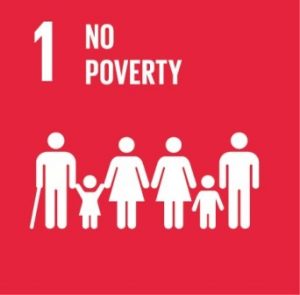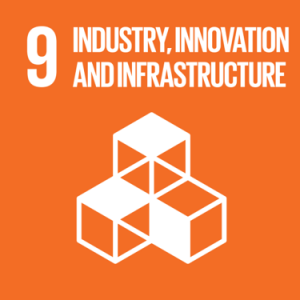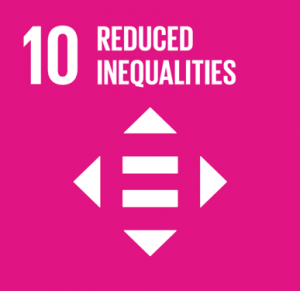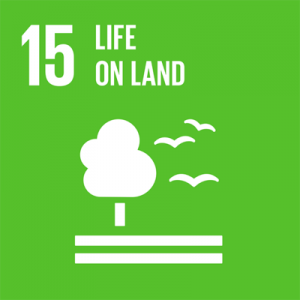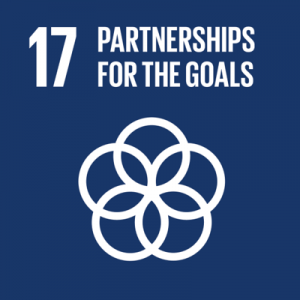SUSTAINABLE DEVELOPMENT GOALS
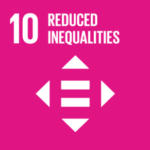
SDG 10: REDUCED INEQUALITIES
“Equality needs to underpin every aspect of sustainability if the objectives of the SDGs are to be met. Although SDG 5 Explores this through the prism of gender, SDG 10 takes a broader look at intersectionality of disadvantages. This disadvantages can be felt through all of the other key issues raised by the SDGs – disadvantaged groups are both more likely to be unable to take advantage of progress and to suffer from the effects of climate change.”
(THE Impact Rankings)
Measures Against Discrimination
IPB University upholds a non-discriminatory admissions policy that guarantees fairness and equal opportunity for all applicants. This policy ensures that individuals are not treated differently on the basis of race, gender, religion, nationality, ethnicity, disability, or socioeconomic status. The university is dedicated to fostering diversity and inclusion within its student community, reflecting its commitment to a vibrant and pluralistic academic environment.
All candidates are assessed solely on their academic merit, potential, and personal accomplishments, free from any bias or prejudice. The admissions criteria and selection procedures are clearly defined and publicly accessible, enabling applicants to understand the standards and process involved.
In circumstances where affirmative action or positive discrimination is implemented—such as scholarship schemes or reserved opportunities for underrepresented groups—the rationale and objectives of these measures are clearly articulated. These initiatives aim to create equitable access to higher education by supporting students from disadvantaged backgrounds, in alignment with national policies and international best practices promoting educational equity.
Moreover, IPB University’s admissions guidelines are openly published on its official website and related platforms, ensuring transparency and accessibility as stated in the Rector Regulation of Bogor Agricultural University (IPB) Number 1 of 2022 on the Guidelines for New Student Admissions at Bogor Agricultural University: Point A. This openness underscores the university’s commitment to a fair and inclusive admissions process and reinforces its dedication to cultivating an equitable academic community. IPB also implements policies through Rector’s Decree No. 133/IT3/LK/2020 point B and C regarding commitment to achieving sustainable development goals, one of which is ensuring there is no discrimination and violence based on religion, ethnicity, race, ethnicity, and gender, both in admitting new students and managing human resources.
IPB University actively monitors and supports access for underrepresented and potentially underrepresented groups, including students from low-income backgrounds, individuals with disabilities, and non-traditional learners. To expand higher education access for underprivileged students, IPB, in collaboration with the IPB Alumni Association (HA IPB) and Bank Syariah Indonesia (BSI), launched the Series 01 Waqf Deposit program, a sharia-compliant financial initiative that provides sustainable scholarships funded by alumni and community contributions. This program ensures financial assistance for students at risk of dropping out or relying on high-interest loans. The university also fosters an inclusive examination environment, offering accessible exam rooms, designated chaperone areas, and systems to accommodate participants with special needs, as exemplified by students like Tria, who actively participated despite educational challenges.
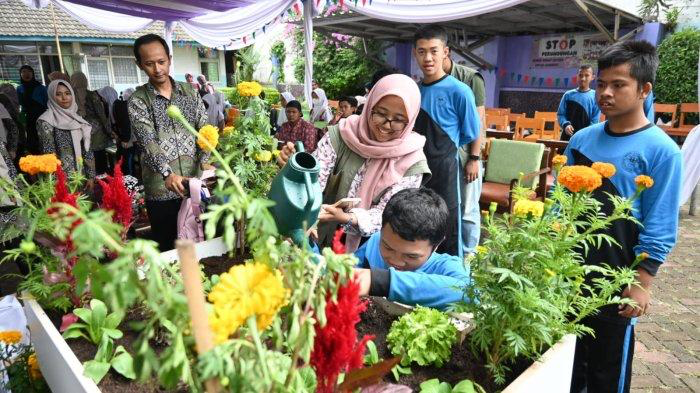
Furthermore, through a collaboration with PT East West Seed Indonesia (EWINDO)and special needs schools (SLB), IPB developed the EasyGrow urban farming kit, enabling students with limited mobility or wheelchair use to engage in agricultural learning, aligning with broader efforts to implement inclusive agriculture as part of sustainable development. These initiatives, together with programs supporting the elderly and disabled, demonstrate IPB University’s commitment to creating equitable and accessible educational opportunities, ensuring that learning, productivity, and social participation are available to all members of society regardless of physical or socioeconomic limitations.
IPB University takes planned and proactive actions to recruit students, staff, and faculty from underrepresented groups, reflecting its strong commitment to diversity and inclusion across all levels of the academic community. Targeted Outreach and Recruitment Programs: The university conducts outreach to reach underrepresented populations, including ethnic minorities, low-income students, students with disabilities, and students from rural or remote areas. Special facilities and financial support are provided to ensure that these groups have equitable access to higher education. For example, during the 2024 UTBK Competency Test at IPB Vocational School, two blind participants from Bogor successfully completed the exam with accommodations, demonstrating that physical limitations do not hinder access when appropriate support is in place.
Scholarships and Financial Aid: IPB offers scholarships targeting students from low-income families, underrepresented regions, and developing countries. The KNB Scholarship Program supports international students from developing nations, with the Graduate School monitoring academic progress, Indonesian language proficiency, and cultural adaptation to ensure full participation in campus life. Additionally, the Series 01 Waqf Deposit program provides sustainable funding for financially disadvantaged students.
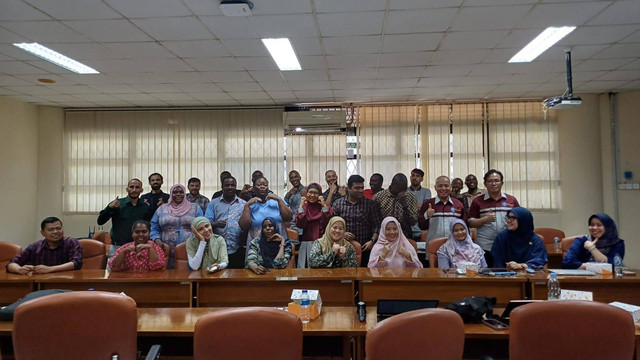
For faculty and Staff Recruitment, IPB actively promotes inclusive hiring practices for faculty and staff. Vacancies are widely advertised, and recruitment committees are trained to minimize bias and ensure fair evaluation of candidates from diverse backgrounds.
Partnerships and Collaboration: The university partners with local and national organizations to create pathways for underrepresented groups into higher education and academic careers. A notable example is the MoU with PT Industri Morowali Industrial Park (IMIP), which includes recruitment initiatives, internship programs, and scholarships to prepare flexible human resources.
Mentoring and Support Programs: Upon admission, students and staff from underrepresented groups receive mentoring, academic counselling, and career development support. Initiatives such as the EasyGrow urban farming kit and research projects for people with disabilities empower participants to actively engage in learning, research, and community development.
Career Development Initiatives: Programs such as the SVIPB Career Expo 2024 connect students and graduates, including those from underrepresented groups, with industry opportunities, further supporting inclusion and workforce participation.
Through these comprehensive measures, IPB University demonstrates a structured approach to fostering an inclusive academic community, ensuring that students, faculty, and staff from diverse backgrounds have equitable opportunities to succeed and contribute meaningfully to the university and society.
IPB University has a comprehensive anti-discrimination policy designed to ensure fairness, respect, and equality across the university community, including students, faculty, staff, and visitors. IPB University has an anti-discrimination and anti-harassment policy. IPB also has Rector’s Regulation No. 13/I3/KM/2015 concerning IPB University Campus Life Rules. Article 12(g) page 8 emphasizes that all IPB residents are prohibited from “carrying out verbal violence (bullying) intentionally to hurt or injure another person or group of people directly or indirectly through print or electronic media.”
Key Features:
- Equal Opportunity:
- Ensures all members of the university have equal access to education, employment, and other opportunities.
- Strictly prohibits discrimination based on race, ethnicity, religion, gender, disability, age, or other characteristics.
- Promotes an inclusive environment where diversity is valued, fostering mutual respect and understanding.
- Zero Tolerance for Harassment:
- Prohibits verbal, physical, or emotional harassment targeting individuals or groups.
- Incidents of discrimination are taken seriously, with established procedures for prompt resolution.
- Support and Resources:
- Offers counseling and support services for individuals experiencing discrimination.
- Conducts awareness and educational programs to prevent discrimination and promote inclusion.
- Grievance Procedure:
- Provides a clear and confidential process for reporting discrimination.
- Ensures thorough investigation and corrective action when necessary.
Practical Initiatives Supporting Anti-Discrimination:
- Sexual Violence Prevention: Collaboration with DWP Undana and the Undana Sexual Violence Prevention Task Force to strengthen campus safety and institutional capacity in addressing sexual violence.
- Safe Digital Spaces: Joint seminars with the Ministry of Communication and Informatics (Kominfo) and the House of Representatives of Indonesia to educate on online sexual violence prevention and promote positive digital culture.
- Anti-Bullying Campaigns: Development of the educational board game Buddy Pekerti and the #1MillionYouthsStopBullying campaign to prevent bullying among students and promote safe, supportive learning environments.
Through these policies and initiatives, IPB University actively fosters a safe, inclusive, and supportive environment, ensuring that all members of its community can participate fully and equitably in academic and campus life.
IPB University does not label a single “Diversity & Equality Office,” but it has established structures and programs that effectively perform the role of advising on and implementing policies, programs, and training related to diversity, equity, inclusion, and human rights on campus.
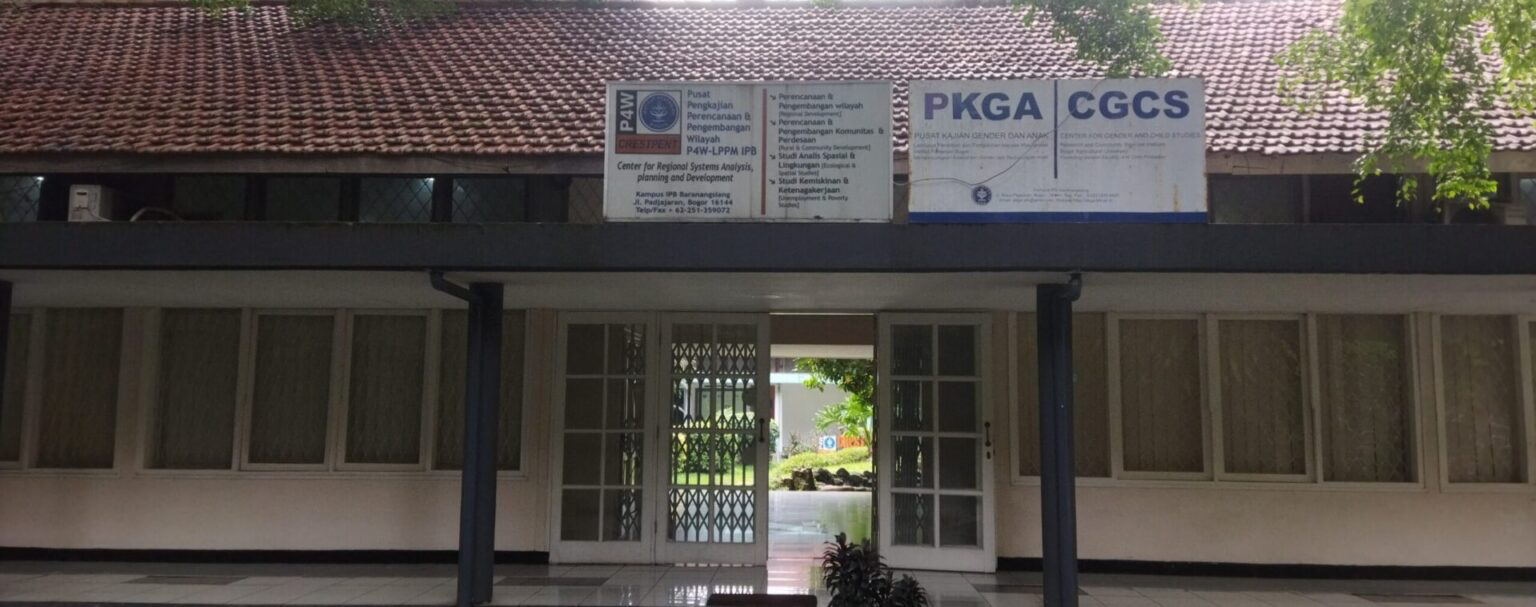
Key Mechanisms and Examples:
- Centre for Gender and Child Studies (IPB University)
- Serves as the university’s principal in-house expert body on gender equality, inclusion, and child rights.
- Provides technical expertise, research, and policy advice to the university and external stakeholders.
- Implements trainings, capacity-building programs, advocacy initiatives, and multi-stakeholder collaborations to promote equity and inclusion.
- Integrates gender equality and child protection perspectives across the university’s Tri Dharma of Higher Education (education, research, and community service).
- Supports institutional and network development for women’s studies and related initiatives.
- Student-Led Programs and Awareness Initiatives
- Example: G.E.M.A (Gender Equality Matters), conducted by the Digital Communication and Media Study Program at IPB Vocational School.
- Activities included observation, research, interviews, discussion forums, and action-oriented projects on gender equality, involving both female and male students.
- External Collaboration and Policy Influence
- The Centre for Gender and Child Studies collaborates with local governments and agencies to strengthen gender-responsive policies, such as the Gender Mainstreaming Working Group in Indramayu Regency.
- Provides guidance and advocacy for regional work units on gender equality, contributing to broader societal impact and recognition such as the Parahita Ekapraya Award (APE).
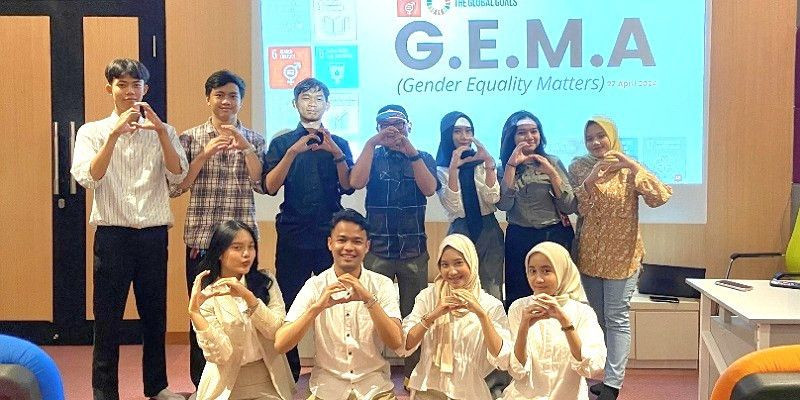
While IPB University does not maintain a formal “Diversity & Equality Office” title, the Centre for Gender and Child Studies functions as the main body fulfilling this role. It advises the administration, implements programs and trainings, conducts research and monitoring, and engages in advocacy and capacity-building on issues of diversity, equity, inclusion, and human rights on campus and beyond.
IPB University actively provides mentoring, counselling, and peer support programs to support students, staff, and faculty, particularly addressing the needs of underrepresented groups:
- Guidance and Counselling Workshops
- IPB organizes workshops for guidance and counselling teachers across Indonesia, focusing on strategies to support Gen-Z students in navigating personal and emotional challenges.
- These workshops aim to enhance educators’ understanding of students’ backgrounds and emotional development, ensuring counselling interventions are effective, inclusive, and supportive.
- Mentoring Programs through Student Associations
- The Islamic Student Association (HMI) at IPB University runs mentoring programs for students in the Certified Independent Study Program (MSIB) Batch 7.
- Mentors provide guidance on internships, career preparation, and professional networking, supporting students’ development and integration into the workforce.
Through both formal counselling initiatives and peer-led mentoring programs, IPB University creates support structures that help students from diverse and underrepresented backgrounds develop academically, professionally, and personally.
IPB University provides a range of accessible facilities and services to ensure that students, staff, faculty, and visitors with disabilities have equal access to education and campus resources. Key provisions include:
- Physical Accessibility
- Access ramps, accessible toilets, and designated waiting/seating areas for people with disabilities.
- Adaptation of classrooms and campus spaces to accommodate mobility needs.
- Information Accessibility
- Public information available in Braille and accessible digital formats.
- Touch-screen service points adapted for accessibility.
- Academic Accommodations
- Adjustments and facilitation during admission processes and national exams (UTBK/SNBT) for applicants with disabilities.
- Adaptation of course materials and support for inclusive learning.
- Institutional Commitment
- IPB’s policies, sustainability initiatives, and SDG-focused projects emphasize inclusion and accessibility.
- Continuous improvement of infrastructure and services to create a fully inclusive academic environment.
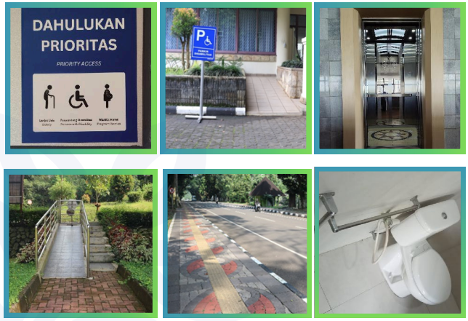
Through physical, informational, and academic accessibility measures, IPB University demonstrates a strong institutional commitment to inclusivity, ensuring that people with disabilities can fully participate in all aspects of university life.
IPB University demonstrates a strong commitment to supporting people with disabilities, combining structured services with case-by-case individualized assistance and institutional initiatives to foster an inclusive campus environment. IPB University provides multiple support services to ensure students, staff, and faculty with disabilities can participate fully in university life:
- Academic & Exam Support
- Facilitation during national exams and admissions (e.g., UTBK/SNBT) for students with disabilities.
- Adaptation of course materials and learning environments as needed.
- Counselling & Mentoring
- Psychosocial support, peer mentoring, and academic counselling explicitly include students with special needs.
- Trained staff and peers provide guidance and assistance tailored to individual needs.
- Case-by-Case Personal Assistance
- Some individual supports—such as personal assistants or sign-language interpreters—are arranged as needed rather than as universal, ongoing services.
- Institutional Initiatives & Partnerships
- Disability-friendly campus programs, inclusive curriculum, and collaborations with disability organizations.
- Dedicated contact points and communities (e.g., SIDIPB, ISC helpdesk) coordinate requests and provide assistance.
IPB University provides multiple access schemes and accommodations for people with disabilities, implemented across several units rather than through a single centralized office:
- Physical Accessibility & Facilities
- Ramps, lifts, reserved parking spaces, accessible pedestrian routes, and special waiting/seating areas for people with disabilities.
- Accessible Public Information
- Service announcements and public information available in Braille, audio/voice features on the website, and digital signage for accessibility.
- Exam & Admission Accommodations
- Adjustments for participants with disabilities in national exams such as UTBK-SNBT, including accessible exam rooms and support during testing.
- Campus Initiatives & Communities
- Inclusive curricula, facility upgrades, and support for students with disabilities are facilitated by academic units, student/community groups (e.g., Sahabat Inklusi), and faculty initiatives.
Implementation:
- Rather than a single central “Disability Office,” access schemes are coordinated through multiple IPB units: PPID (information accessibility), Directorates/Student Affairs (exam accommodations), schools/faculties (physical facilities), and student support communities.
IPB University has a de facto reasonable accommodation strategy with documented, funded, and operational mechanisms to support students with disabilities, demonstrating both policy-level attention and practical implementation. IPB University implements a range of reasonable accommodations for students with disabilities through multiple operational mechanisms, demonstrating both policy and practice:
- Accessible Facilities & Services
- Ramps, lifts, marked parking, pedestrian routes, special waiting areas, and accessible service counters.
- Public service information provided in accessible formats, including Braille documents and digital accessibility features via PPID.
- Exam & Academic Accommodations
- Facilitation for participants with disabilities during national entrance exams (UTBK–SNBT).
- Inclusive curriculum and campus programs to support full participation of students with disabilities.
- Institutional Strategy & Engagement
- IPB collaborates with the Komisi Nasional Disabilitas (National Disability Commission) on initiatives to develop a “kampus ramah disabilitas” (disability-friendly campus), reflecting a strategic and institutional commitment.
- Funding & Implementation
- Accommodations are operationalized through multiple university units (PPID, academic units, student services) and appear to be integrated into the university’s regular facilities and services budget, ensuring ongoing support rather than ad hoc measures.
IPB University is deeply committed to creating a safe, respectful, and inclusive environment for all students, staff, and faculty, underlined by a comprehensive anti-harassment policy. This is stated in Circular Letter Number : 24799/ITS/KP/2021 Concerning Creating A Gender-Responsive and Socially Inclusive Campus (page 2). IPB University is fully committed to creating a safe, respectful, and inclusive environment for the entire academic community, as part of its comprehensive anti-harassment policy. The university’s anti-harassment stance is embedded in an institutional ethic that emphasizes dignity, mutual respect, and equality. This policy covers various forms of harassment, ncluding sexual harassment, verbal and physical abuse, and discrimination based on gender, race, disability, or other personal characteristics. This policy has been actively enforced through various programs, including awareness campaigns, formal reporting mechanisms, and a supportive and encouraging environment that fosters open dialogue.
In line with the Indonesian Ministry of Education’s regulations on the prevention and handling of sexual violence in higher education, IPB University has implemented strict guidelines for addressing and mitigating harassment. As part of this initiative, IPB hosts workshops, webinars, and training sessions to educate the campus community on recognizing, preventing, and responding to harassment.
IPB University has also established a confidential reporting and support system to protect victims and witnesses of harassment. This system allows individuals to report incidents safely and without fear of retaliation, ensuring their cases are handled with confidentiality and respect. Through IPB University’s Counseling and Psychology Services Center, students can access counseling support, helping them address harassment-related issues in a safe and supportive environment. The center not only provides psychological assistance but also plays a vital role in raising mental health awareness on campus, which in turn helps prevent the negative impact of harassment on students’ academic and personal lives (ipb.ac.id).
Supporting its anti-harassment efforts, IPB University is one of the leading universities in Indonesia that collaborates with NGOs and government agencies to build a safe academic culture. In addition to these initiatives, IPB University has been recognized for its leadership role in promoting ethical practices and inclusivity, earning awards at national and regional forums. This recognition underscores the university’s commitment to fostering respectful behavior and maintaining a zero-tolerance policy toward harassment. IPB’s ongoing educational outreach campaigns and initiatives aim to ensure that all community members are aware of their rights and responsibilities, contributing to an environment where harassment is not tolerated in any form.
The university’s focus on transparency and accessibility in its anti-harassment measures is further strengthened by its online portal, which provides information on reporting procedures, available support services, and policy details. This portal has become a vital tool for students and staff, enabling them to understand and access resources related to preventing and reporting harassment. Furthermore, IPB has implemented a structured response framework, ensuring that complaints are handled promptly and impartially.
Through these well-defined policies, partnerships, educational efforts, and support services, IPB University not only enforces its anti-harassment policy but also cultivates a campus culture founded on safety and respect. This approach reflects the university’s commitment to maintaining a harassment-free learning and working environment for all members of its community.
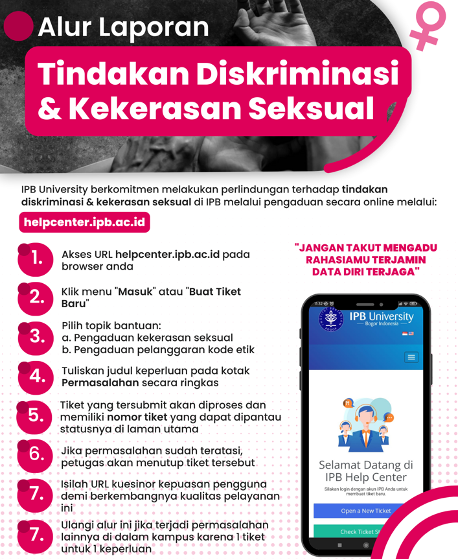
SDG 10 IN NUMBER
4,429
Number of students starting 1st degree
2,945
Number of 1st generation students starting 1st degree
66,49%
Percentage of first-generation students
35,683
Number of students
591
Number of students from developing countries
0.016%
Percentage of students from developing countries
35,683
Number of Students
100
Number of students with disabilities
0.28%
Percentage of students with disabilities
3,371
Number of employees
5
Number of employees with disability
0.001
Percentage of employees with disability
RELATED NEWS
It seems we can't find what you're looking for.

